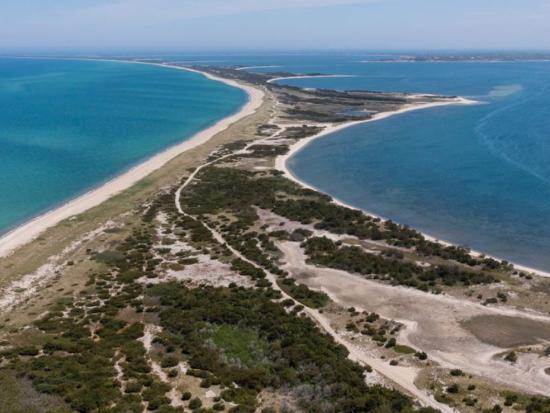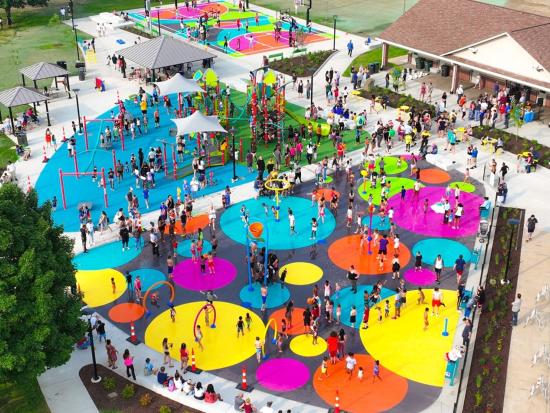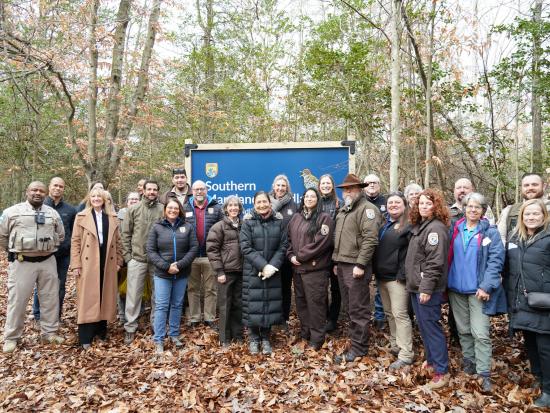Assistant Secretary Estenoz Highlights President Biden’s Investing in America Agenda Resources for Ecosystem Restoration in Massachusetts and Rhode Island
Date: Wednesday, May 22, 2024
Contact: Interior_Press@ios.doi.gov
PROVIDENCE, R.I. — Assistant Secretary for Fish and Wildlife and Parks Shannon Estenoz traveled to Massachusetts and Rhode Island this week, where she highlighted how investments from President Biden’s Investing in America agenda and America the Beautiful initiative are helping restore ecosystems for the benefit of both people and wildlife.
In Bridgewater, Massachusetts, Assistant Secretary Estenoz joined local and state leaders to celebrate the completion of the High Street dam removal project that will restore the river and support aquatic connectivity. Funded with a $1.55 million investment from the Bipartisan Infrastructure Law, the dam removal has eliminated a downstream barrier to migratory fish passage on the Town River and its aging infrastructure that posed a risk to public safety. The removal of the dam reconnected 10 miles of river to benefit alewife, blueback herring, American eel, sea lamprey and American shad and opened access to 354 acres of spawning habitat for several migratory fish species.
Across the country, millions of barriers are fragmenting rivers, blocking fish migration, and putting communities at higher risk to flooding. Improving fish passage is one of the most effective ways to help conserve vulnerable species while building safer infrastructure for communities and improving climate resilience. The President’s Investing in America agenda makes historic investments in river restoration and aquatic connectivity through a $200 million boost for the U.S. Fish and Wildlife Service’s (Service) National Fish Passage Program and through multiple other partnership-driven conservation grant programs funded by the Bipartisan Infrastructure Law and Inflation Reduction Act, such as the America the Beautiful Challenge.
In Narragansett, Rhode Island today, Assistant Secretary Estenoz toured a new project funded by a $1 million investment from the America the Beautiful Challenge that will recover natural salt marsh hydrology degraded by legacy impacts and address non-native invasive species inhibiting natural processes that at-risk species like the saltmarsh sparrow rely on. The project will improve the resilience and landward migration of 738 acres of salt marsh and coastal upland habitat at five salt marsh ecosystems by creating runnels and maintaining ditches, removing structural barriers and managing invasive species.
America the Beautiful Challenge grants support projects that conserve, restore and connect wildlife habitats and ecosystems while improving community resilience and access to nature, which also advance President Biden’s ambitious environmental justice goals. The Challenge launched in 2022 as a partnership with the Departments of the Interior, Agriculture and Defense, and Native Americans in Philanthropy and is administered by the National Fish and Wildlife Foundation. In its second year, the program awarded 74 grants totaling $141.3 million, leveraging an additional $12.1 million in grantee match for a total conservation investment of $153.4 million. More than 40 percent of projects that received funding were for those being implemented by Indigenous communities.
Assistant Secretary Estenoz wrapped up her trip in Providence, Rhode Island, where she visited Riverside Park to meet with key partners to highlight the success of the Providence Urban Wildlife Conservation Partnership. Since 2013, the Service has worked with a diverse group of community organizations to connect Providence residents to nature. The Partnership improves vital urban wildlife habitat, offers world-class environmental education opportunities and expands access to outdoor recreation. The Assistant Secretary also visited the Frank D. Spaziano Elementary School where she met with teachers and students who shared their environmental education experience as part of the Partnership's Teacher's Institute Program. Through the Program, the Service and partners provide teachers with opportunities to spend a week in the field and introduce them to field biology, wildlife conservation, and the Services’ work with the goal of bringing lessons back to the classroom. Teachers receive year-round support for outdoor learning and a funded field trip to Ninigret National Wildlife Refuge.
###
- Press Release
- Press Release
- Press Release




